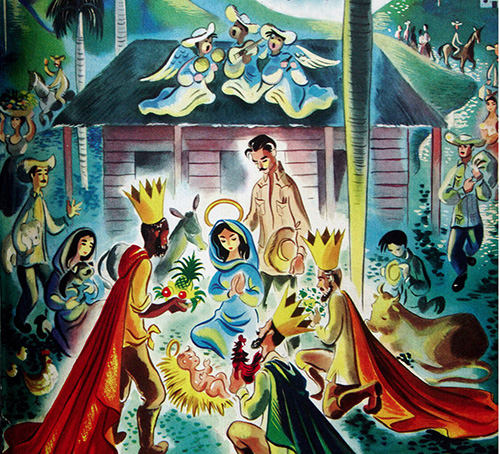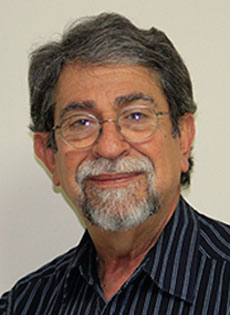Three Kings Day in Cuba
Monday, December 30, 2019
*Emilio de Armas
For those of us born and raised in a free Cuba (1902-1958), the feast of the Three Kings was an eagerly awaited gift, especially in “the countryside” —that is, anywhere outside Havana.
As in all Hispanic countries, Christmas began on December 24 — Christmas Eve — with the Nochebuena, or “holy night”: a family meal with “that poor pig (lechón) who died suddenly, with a blow to the forehead and a huge bump,” as a popular song proclaimed. In Cuba, Christmas Eve was a great “bash,” one of the biggest.

Cover of a 1950s Cuban magazine depicting Three Kings Day.
Uncles, cousins and grandparents have come from their villages and provinces. The fire pit is smoking, and the food fills the house with pleasant aromas. The following day, the 25th, the actual Christmas Day, we ate cold cuts, the succulent “leftovers” of the lechón. But that was just the beginning, because December 31 was approaching and we waited for the New Year’s “bash,” when we threw buckets of water onto the street at midnight so that all the bad things that the Old Year had brought would leave the house. Then, already renewed and full of hope for the New Year, another feast remained: Three Kings Day.
On January 5 in the afternoon, we went out to cut grass for the camels of the Three Kings — Gaspar, Melchior and Balthasar — stacking it into three piles in front of the house, one for each camel. You had to leave water for them, usually in a large bucket, because the camels came from far away, loaded with gifts, and were hungry and thirsty. My cousins and I competed to see who offered the camels the best pile of grass and the most abundant water.
The January sun set during these preparations and night came. It was the longest night of the year because we still had to eat, listen to soap operas on the radio or TV, go to sleep and spend the night dreaming of the gifts we would find in the room the next day at dawn, mysteriously arranged next to the Christmas tree and the Nativity scene – because in Cuba at that time there was no Christmas tree without a Nativity scene, and the mothers competed to see which one prepared the most beautiful one for their children.
However, all this was nothing compared to the dawn of January 6, Three Kings Day. We had written our letters to Gaspar, Melchior and Balthasar, addressed in an envelope to the “Dear Magi,” asking them for the gifts that we wanted for that year. And for the boy or girl who had “misbehaved” during the preceding 12 months, the Kings would leave a sack of coal. But I don't remember anyone receiving a sack of coal. The Magi were so good that they even left gifts at home for our friends.
We ran, then, toward the gifts, no longer able to contain our yearning to open them and find that electric train; the doll that closed and opened its eyes and said “Mama” (possibly in English); the lion that roared with a tin voice; the baseball suit with the colors of Havana or Almendares (I don't remember if Marianao or Cienfuegos were available); the bat, the glove, the ball; the belt with the two cap guns; the Sleeping Beauty dress or the mask of the Beast. For some of us, everything was there, even more than we asked for.
Others, however — my friend Roberto among them — found fewer toys, as if the children of poor families held a smaller place in the heart of the Magi. But no, because sometimes our mother told us, “Let's see, although there’s nothing written, this pull-along car must be for Roberto... You give it to him.”
Joy and sadness on the same day, but they were the joy and sadness born of hope.
The feast of the Three Kings in Cuba, January 6, is a tradition that arrived with the Spaniards, and the Africans in their shacks made their own, year after year, for several centuries.
And it pleases me to believe that the feast itself is a gift from the Magi to all of us.


Comments from readers